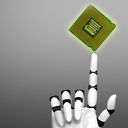Nvidia's boom and Intel's big plans show how AI has turbocharged chipmaking

AI makers' desperate need for millions of powerful chips took center stage on Wednesday as the world's most valuable chipmaker, Nvidia, reported another quarter of massive revenue growth and longtime leader Intel reported progress on reinvigorating its manufacturing operation.
Why it matters: Nvidia's fortunes have soared along with demand for its chips to train and run AI systems — but the rest of the semiconductor industry stands to get a major boost from AI, too.
Driving the news: Intel, which once reserved nearly all its chipmaking capacity for its own processors, is in the midst of a pricy gamble to transform itself into a credible contract-manufacturing rival to Taiwan-based TSMC, which makes chips for firms that design them — like Nvidia.
- At an event in San Jose, Intel said it already has orders worth $15 billion for its foundry business and is on track to be the No. 2 chip foundry by 2030. The company declined to provide any further detail.
Meanwhile, Nvidia reported another blowout quarter, with revenue more than tripling from a year ago — to more than $22 billion — and per-share earnings up 765%.
- CEO Jensen Huang says generative AI has reached a tipping point. "Demand is surging worldwide across companies, industries and nations," Huang says.
Nvidia said that U.S. chip export controls directed at limiting China's access to advanced tech had minimal impact on its business.
- The company hyped expectations around its newest chip, the H200, which will ship in Q2 2024 with the promise of nearly double the performance of the AI business' current favorite, the H100.
OpenAI CEO Sam Altman, who showed up at the Intel event, is reportedly seeking trillions of dollars for a major new chip production effort that could take years to reach the marketplace.
- Altman declined to confirm the Wall Street Journal's report that he is seeking $7 trillion for his new chip venture, but said "the numbers will be big."
- "We think the world is going to need a lot more AI compute," Altman said. "And it's not just semiconductors."
What they're saying: The rise of generative AI has Intel CEO Pat Gelsinger feeling pretty good about his decision to double down on manufacturing.
- "What are we going to do with all those fabs? I think we're going to be building an awful lot of AI chips," Gelsinger told reporters. "Overall demand appears to be insatiable for the need for computing for several years into the future."
Estimates that the chip industry would grow to $1 trillion a year, once seen as aggressive, now look like they might be way too conservative, Gelsinger said.
- Today the semiconductor industry is about half of that, with 2023 sales estimated at around $523 billion globally.
- "If some of these things materialize as we see right now, right, we're going to be capacity-limited again, this decade," Gelsinger said, referring to a situation in which demand for chips outstrips supply.
The typically cyclical industry was famously short on supply during the early days of the pandemic, when car production lines had to be halted due to a lack of semiconductors.
- Gelsinger said Intel is ready to meet demand with its plans for new plants in Ohio and Germany.
- However, meeting the computing needs of AI demands more than just chips.
- "We're going to have to build monster data centers, we're going to have to have lots of energy sources, and we're going to have [to have] lots of semiconductors," Gelsinger said in response to a question from Axios.
The big picture: The surging chip demand comes amid an effort to diversify an industry whose manufacturing has become highly concentrated in Taiwan and Korea, where nearly all of the most advanced chips are currently made.
- The U.S. has poured billions to increase domestic chip production via the Chips and Science Act, with similar efforts taking place in various European countries.
Between the lines: Intel trotted out an intriguing mix of rivals-turned-partners including executives from Arm, Broadcom and MediaTek.
- Intel also announced a deal for its factories to manufacture chips designed by Microsoft.
Yes, but: It's unlikely that generative AI's growth will be linear and without ups and downs. "Will Gen AI go through some other AI winters? Probably," Gelsinger said.
- And even Intel acknowledges that most of its manufacturing capacity for the next couple of years will be used by its own chips, though Gelsinger said he would like to see Nvidia, Qualcomm and even l0ngtime rival AMD building chips at Intel foundries.
Of note: AI is driving the demand, but it's also helping speed at least part of the process of making chips.
- At Intel's event, software firms including Cadence and Synopsys talked about how they are using AI to help automate parts of chip design — and to make it easier for companies to move production from, say, TSMC to Intel or vice versa.
- Keyvan Esfarjani, Intel's chief global operations officer, tells Axios that AI is also reshaping the way he runs the company's factories from monitoring temperature to designing chips and packaging. "You are not doing it for the sake of using AI," Esfarjani says in an interview. "AI gives us the tools to out-innovate in the space."
- It's that last area, the packaging of chips, where Intel is already seeing its strongest initial demand from other semiconductor firms. "There is tremendous interest in our advanced packaging," says Esfarjani.